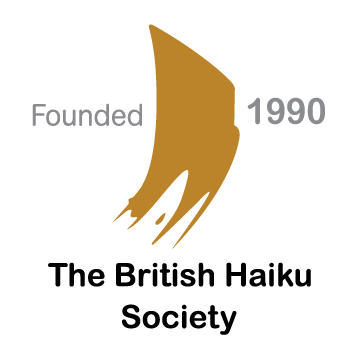This page is effectively an archive of reports and any accompanying illustrations which originally appeared on our main Events page and which are transferred here when they can no longer be considered current or even recent. We regret that this page was not created earlier in the life of the BHS website, as all the reports which appeared prior to mid-2008 have long been deleted, although some of the photographs are still held and these may appear here in coming months.
Newcastle/Gateshead Regional Group inaugural meeting – 15 March 2009
Group organiser Chris Phillips reports on the first meeting: “Our first Morden Tower workshop went well, thanks to the generosity of Connie Pickard in agreeing to let us use the Tower, and the hard work of Fred Schofield and Martin Lucas who travelled up from Leeds and Preston, respectively, to lead it.
“The day was split into two parts, both generating lots of discussion about how a haiku can be defined. We began by looking at favourite haiku brought along by members, paused for tea and cake, and then moved on to two activities provided by Fred:the first, a collaborative exercise, involved piecing together existing haiku which had been cut up; it was interesting that several new and plausible haiku could be generated. In the second activity, we were each given a list of single lines and asked to form a haiku around any of them. The spontaneity of the poems produced delighted us, with no-one failing to ‘score a hit’ with at least one of their efforts.
“(Re the second activity: there was concern, initially, that writing in response to a given image, instead of a haiku moment of your own, would not be as successful, in the sense that you have to use your imagination or summon up an event from your past, thereby losing any sense of the ‘immediacy’ of that moment. However, the effect of the poems on the listeners was, as Martin pointed out, often an immediate and empathetic one. Furthermore, it’s not always possible or practical to scribble down your response to an experience immediately, and most haiku therefore rely on a recalled experience.)
“It was lovely to meet new people and share poems and views. Connie has kindly offered Morden Tower as a venue for future haiku workshops, so watch this space: the next one will be in May.” If you wish to attend the next meeting, see below for Chris’s contact details.
BHS AGM and Winter Gathering, London, 22 November 2008
British Haiku Society members from all over England attended the AGM and Winter Gathering on 22 November at Conway Hall in London.
Susan Lee Kerr chaired the AGM and Special Meeting which followed. They produced some interesting discussions.
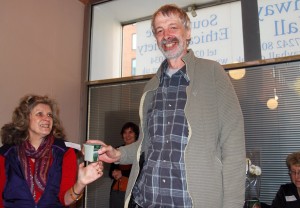
L-R: Susan Lee Kerr, Annie Bachini (background), Steve Mason and Doreen King (background)
The events part of the day then followed, and in the company of quotes from such notables as Proust, Einstein, Blake and more, Diana Webb encouraged us to brave the cold and to notice the world around us in Red Lion Square.
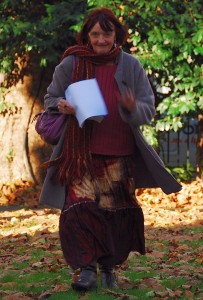
Diana Webb in an autumnal Red Lion Square
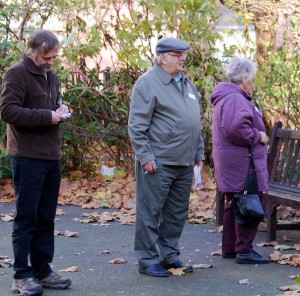
L-R: Andrew Shimmield, Brian and Sheila Wells in Red Lion Square
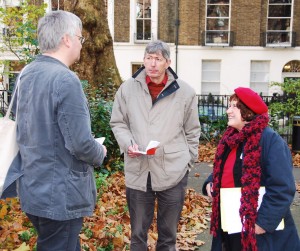
L-R: Alan Summers, Tony Marcoff, Katherine Gallagher in conversation outdoors
Once back in the warm, members offered haiku from their observations.
Then we got down to some hard graft in a workshop run by David Cobb where we explored the concept of disjunction. Working in groups we focused on individual haiku to assess whether they were disjointed and how that influenced their effect on us.
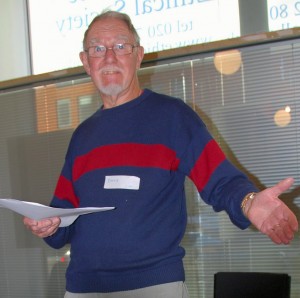
David Cobb hosting his \’disjunction\’ workshop
Our thanks to Frank Williams for providing all these AGM photographs.
Paul Matthews, a poetry teacher at Emerson College, took the floor next. After outlining how he came to haiku, his talk put particular emphasis on haiku as a point where the external and internal meet. And we all enjoyed the short writing workshop where we wrote diamond shaped poems.
Although Dick Pettit was unable to be with us in person, his contribution on ‘renga linking from Basho’s Nagoya Group’ was presented by Diana Webb. The readings of the two renga examples were performed by Frank Williams, Andrew Shimield and Anthony A Marcoff.
This was followed by a tribute to William J Higginson led by Annie Bachini. Members spent some time reflecting on Bill’s contribution to haiku and their personal memories of him.
the silhouette of a heron
in canal reeds
And last, but definitely not least, Alan Summers talked about, and demonstrated, alternatives to haiku being on a page. He started with photos of the Haiku Pathway in New Zealand, where haiku are carved on stone, and continued with various examples that his project ‘with words’ has been involved with, in this country and abroad.
Overall, we were treated to a varied and stimulating day.
Hard Rain and Haiku – Southampton, 6 September 2008
This event came about through Mauri G Askell’s response to a questionnaire sent to all members by Annie Bachini last year. Mauri led the way.
The venue, Southampton Common, is flanked on one side by the Avenue, described in J.B. Priestly’s English Journey of 1933 thus, “This fine approach very gradual and artful in its progression from country to town”. On the other side is Southampton Old Cemetery, laid out in 1845-1863 and now designated a site of ‘special scientific interest’. It contains three chapels.
The Common itself consists of 376 acres and has several water features, the Cowherds Inn, and the Urban Wildlife Centre – our meeting point.
A bright early morning soon deteriorated into rain which became heavier from the moment we (13 in all – Mauri G Askell, Annie Bachini, Timothy Collinson, Pearl Dell, Jane Dudley, Robin Furth, Martin Lucas, Anthony A Marcoff, Mark Rutter, Alan Summers, Diana Webb and Alison Williams) commenced our ginko. It was suggested that this took place in silence to allow a greater focus on note-taking, although this was not strictly adhered to.
After two hours in heavy rain, covering grassland, scrub, skirting lakes and a meander through the Victorian cemetery, we returned to the Wildlife Centre and took a break for lunch.
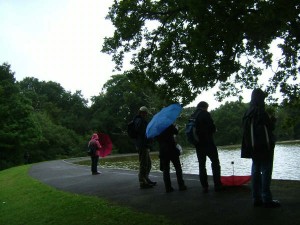
Some of the \’weatherproofed\’ attenders at the pond
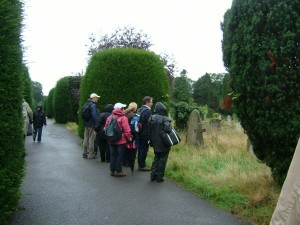
Another picture of Southampton attenders, this time in the cemetery
Martin Lucas led the afternoon session, which began with contributions from all, in the form of notes and haiku from the ginko – surprisingly, notebooks had survived the rain! Martin then introduced a session based on around three different translations/interpretations of well known classical haiku, which proved insightful.
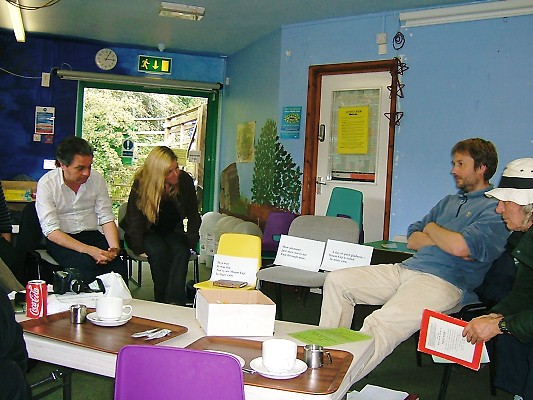
In the warm and dry at Southampton – L-R: Mark Rutter, Robin Furth, Martin Lucas, Mauri Askell
A short stroll and a relaxing half-hour followed in the Cowherds Inn.
Mauri felt that those attending “found the day worthwhile, brought something to the day and hopefully left one step further on”.
Haiku from the ginko
through the heavy rain
z g z n
i a i g
g
only one white butterfly
small journey
quietly undertaken
a jag of colour intrudes
mauri g askell
faint rain
the paddling pool flag
unfurled
after the rain
everyone happier
except the gargoyle
Martin Lucas
ducklings cheep enquiringly
at the haiku poets —
get nothing
cross leaning out
of autumn nettles
‘thy will be done’
Mark Rutter
persistent rain-
on one fallen leaf
the wine colour deepens
focus
on a Mount Fuji haiku-
a squirrel whisks by
Diana Webb
BHS Day in Broadstairs, 21 June 2008
summer solstice—
awaking to the muffle
of drizzle
Jon Baldwin
In hazy midsummer sun, and a room overlooking Viking Bay, Felicity Brookesmith opened the BHS day in Broadstairs to 13 keen participants.
The event had received publicity in the Isle of Thanet Gazette of 13th June, which included a photograph of Felicity holding a copy of Blithe Spirit. However, many of the attendees heard about the day through Felicity’s network of writing groups.
In his talk, as well as charting the evolution of haiku from other Japanese writing forms, Martin Lucas detailed how English syllables differ from how sounds are counted in the Japanese language and, thereby, explaining why most writers of haiku in English do not write in 5-7-5.
Annie Bachini then ran a workshop that introduced the role of kireji in haiku and also the concepts of sabi, karumi and yugen.
After lunch, all participants were busy writing, sharing and discussing their work. Selected haiku were then put on the board for further comments.
Felicity read some of her haiku that drew their inspiration from the local environment, and Martin followed this by talking about setting up a local group in Kent. He illustrated the various possibilities from his experience in the Yorks/Lancs group and Annie chipped in with information on how they do things in London.
As well as Jon Baldwin, other BHS members there were Phillip Murrell and Mark Ritchie.
the longest day—
sun the cooler for mist
pearling the sea
Felicity Brookesmith
At the time of writing, Felicity is busy looking for a venue for the first meeting of the Kent group.
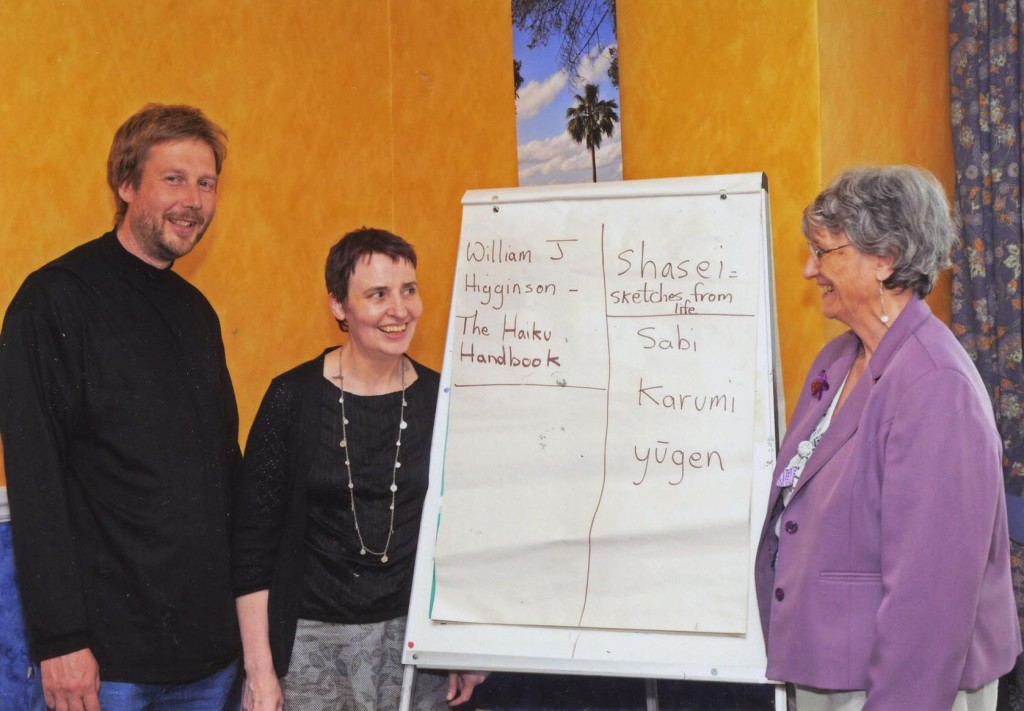
From left: Martin Lucas, Annie Bachini, Felicity Brookesmith
(photos courtesy and copyright of Isle of Thanet Gazette)
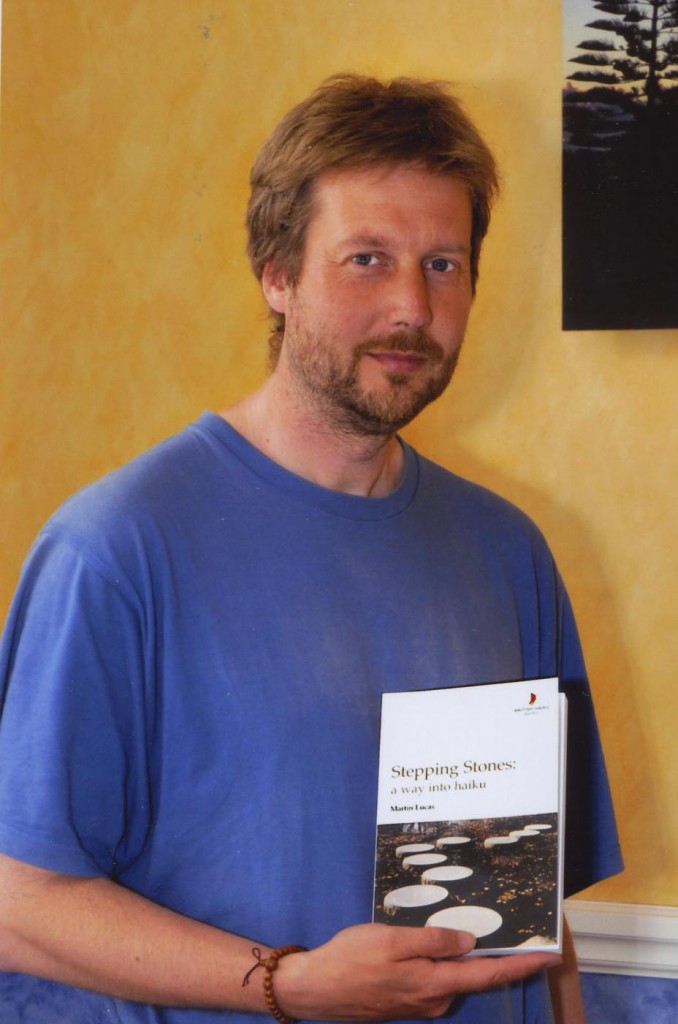
Martin Lucas holds a copy of his recent book, Stepping Stones.
(photos courtesy and copyright of Isle of Thanet Gazette)
